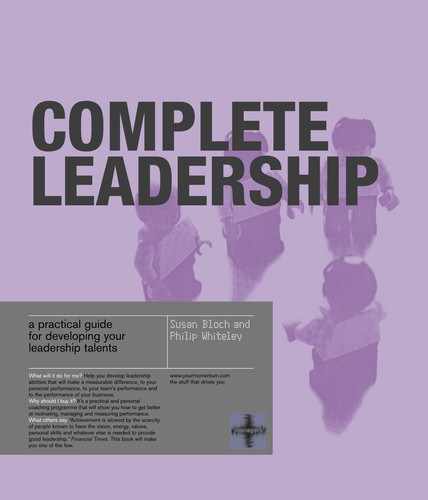
We believe that it is, and this leads us on to what we believe is an
important principle.
We learn from what we do well, not from our
mistakes
There is a Gary Larson ‘Far Side’ cartoon where a mother from the
Classical World is complaining to her teenage son: ‘And another
thing, I want you to be more assertive. I’m tired of everyone calling
you “Alexander the Pretty-Good”.’
One intriguing new academic theory is that we tend to move
towards the image we project for our future. Call ourselves ‘great’,
and we are more likely to become great. One note of caution,
however: this is a developmental process, not a magic solution. The
theory, known as ‘Appreciative inquiry’, was developed by Dr David
Cooperrider at the Case Western Reserve University in the early
1990s. He argues that we tend to move in the direction of the subject
matter of our conversations, and the content of our dreams. If we talk
about problems, we inhabit problems. If we talk about achievements,
we achieve. There is a ‘Pygmalion effect’ that has been observed in
education: if teachers are told that their pupils are bright they are
more likely to be effective teachers.
13
The theory rests on an observation that the human brain does not
obey the instruction ‘don’t’ very well. It is a common experience of
many people who have played sport. If the coach says, ‘Don’t go into
the rough,’ or, ‘Don’t serve into the net,’ then sure enough we do. If
we focus on the positive goal, we are more likely to achieve it.
Appreciative inquiry, when applied in organizations, involves the
use of small and large group meetings to begin a process of sharing
momentum complete leadership chapter two
39
pages 38 /
Is change only possible if we receive awkward
feedback, or if we miss the promotion we wanted, or if
we are made redundant?
ideas on what is working well, using this to set a vision, and then
working towards that vision. One academic article describes the
process as follows:
‘Consider two ways you as a manager might welcome new
employees. If you ask them to tell you about problems they
encounter as they get acquainted with their new colleagues and
new job, then you are, no matter how well intended, planting
seeds of problems and you will most certainly hear about them.
If, on the other hand, you request that they try to discover what
contributes to their new work group’s high levels of cooperation
and success, you are planting seeds of learning about
cooperation and success.’
14
This is obviously applicable to individuals as well. As humans we
are prone to creating self-fulfilling prophesies, so it is better to make
sure that our prophesies are positive.
Claire Hall-Moore, associate partner at consultancy group Accenture,
comments:
‘I really wanted to get promoted to the role of Associate Partner.
Working with my coach [Susan Bloch], I realized that an
important step in career development is to perceive yourself in
the position and the role. If you start to perceive yourself as
being able to do things, you behave in a commensurate manner
and that also starts to impact on the people around you. For me,
it was a really good piece of advice, and coaching helped me to
be able to perceive myself as part of the leadership team already
[before promotion], and to behave in that way. I think it worked
very well and it helped me make the transition into my new role.’
In this book we invite you to build on your strengths as well as
acknowledge areas for development. Logically, there ought to be
more to learn from strengths than from weaknesses. If we are doing
something poorly, there is an infinite number of options for change,
and simply being reminded of this offers no clues for improvement.
..................Content has been hidden....................
You can't read the all page of ebook, please click here login for view all page.
